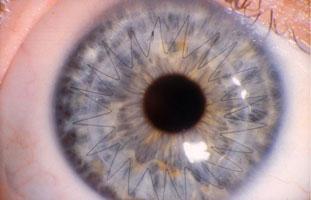

When the cornea is damaged by injury or disease, significant vision loss can occur, and a corneal transplant may be necessary to restore vision. Full-thickness corneal transplant surgery also called Penetrating Keratoplasty (PK) or corneal graft, involves removing and replacing the damaged or diseased cornea with a donor cornea.
The cornea is the outmost lens of the eye. It is made up of five layers of smooth, transparent material and serves two main purposes: first, it acts as a protective shield for the eye, keeping it free from germs, dust, and other foreign material; and second, it functions as a window, controlling and focusing light that enters the eye.
Generally, injury or infection confined to the outermost layers of the cornea can be effectively treated with little or no permanent impact on vision. However, if the inner layers of the cornea are affected, the greater the risk of permanent damage, including corneal scarring and vision loss.
When corneal injury or disease interferes with a patient’s quality of life, then a corneal transplant should be considered. Common reasons for transplant include:
To improve optical quality and enhance vision. Examples of conditions requiring optical treatment include the replacement of an opaque and scarred cornea or a cornea distorted by severe astigmatism due to keratoconus.
To reconstruct the anatomy of the cornea and preserve the eye. This includes cases where the cornea has been damaged or perforated due to injury.
To preserve the eye by treating diseases that are unresponsive to medications or other forms of medical therapy. As an example, therapeutic management may involve treating recurrent ruptured bullae in bullous keratopathy or a severe, uncontrolled fungal corneal ulcer.
Other conditions that may warrant corneal transplantation include: Fuchs’ corneal dystrophy, keratitis, corneal stromal dystrophies, and regrafts.
Corneal transplant surgery is the most commonly performed transplant surgery in the United States – approximately 40,000 individuals undergo the procedure every year.
In full-thickness corneal transplant surgery, surgeons first remove the damaged or diseased corneal tissue with a”cookie-cutter” type instrument called a trephine. The cornea is then replaced with a precisely matched donor corneal graft that is anchored to the surrounding host tissue by tiny hair-thin sutures. In most cases, surgery is performed with a general or local anesthetic on an outpatient basis.
Corneal tissue comes from an eye bank that receives donor tissue. Unlike other transplants, the corneal graft does not need to go through an extensive typing procedure in order to match donor and host. Donor corneal tissue is selected by factors such as: the donor’s age and cause of death; duration between the death and transplant; the presence of donor eye diseases such as AIDS, syphilis, or hepatitis; and previous eye surgery.
Recovery from corneal transplant surgery generally takes six months to a year depending on wound healing time, refraction changes and corneal astigmatism.
Immediately following surgery, eye shields are worn to prevent damage to the eye from possible trauma (bumping, hitting or rubbing the cornea). Topical antibiotics are used for several weeks, and topical corticosteroids are used for several months to reduce the possibility of infection or graft rejection. Strenuous activities such as lifting, bending, or straining should be avoided for several weeks.
Early in the postoperative stage, the surgeon will monitor the cornea shape through corneal topography, a computer mapping of the cornea, in order to control astigmatism caused by sutures changing the corneal shape. In some cases, patients may wear a rigid, hard contact lens over the corneal transplant to reduce astigmatism.
Complications of corneal transplant surgery can include:
Medications, including antibiotics and corticosteroids, along with careful monitoring throughout the recovery process can reduce or prevent complications such as these.
Graft rejection following corneal transplant surgery may occur. Symptoms such as photosensitivity, ocular ache or redness, and decreased vision may be indications of rejection. Treatment with corticosteroid drops can often reverse graft rejection, however, factors such as the severity of the rejection, the length of time between onset and discovery, and a history of previous graft failures may impact treatment and result in a complete graft failure. Regraft is a possible solution, however, the long-term prognosis for a regraft is lower than it was for the original graft. Another possible solution for patients with a history of multiple graft rejections may be the implantation of an artificial cornea.
The success rate of corneal transplant surgery and a return to full vision varies according to the diagnosis and other factors such as glaucoma, retinal degeneration or optic nerve disease. On average, the long-term transplant success rate is about 85%-95% for conditions such as keratoconus, corneal scars, early bullous keratopathy, corneal stromal dystrophies, or inactive viral keratitis. Active corneal infections and chemical or radiation injuries are much more difficult to treat for full vision restoration due to progressive inflammation or damage to other portions of the eye.
Your ophthalmologist will consult with you about your specific condition and can assess more accurately the long-term prognosis based on the specific factors affecting your individual case.
Colorado Eye Consultants is dedicated to the preservation of sight and providing patients with the quality of life they deserve. Our patients receive personalized care by knowledgeable and experienced board certified ophthalmologists to ensure the clarity needed to see the most important things in their world. Your vision is our utmost priority and we offer same day appointments to ensure you get the care you deserve!
Request an Appointment